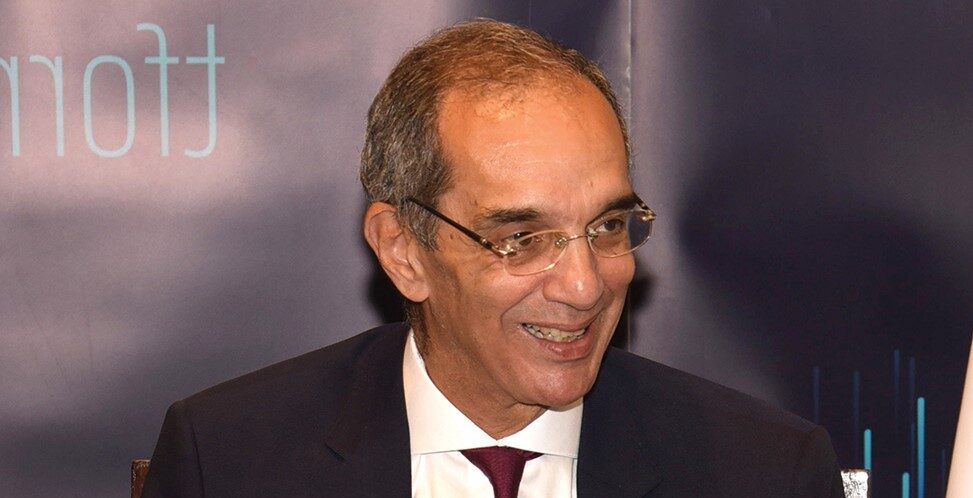Home to more than 100 million, mostly young, citizens, Egypt sees that leveraging digital technologies, tools, and solutions are imperative to creating a sustainable economy. They would ensure government services conveniently reach all residents, create jobs and increase digital exports.
Despite the fast-paced nature of the sector, Minister of Communications and Information Technology (ICT) Amr Talaat believes that maintaining the same vision is essential. “It is imperative that our strategy and strategic goals remain the same,” he told Business Monthly on the sidelines of the AmCham Egypt Pre-Annual General Meeting held May 5. “It … reflects positively on long-term planning, [helping] our partners in the sector understand what we are trying to do. [That] forges better long-term cooperation with [Egypt’s] ICT ecosystem.”
The ministry’s strategic priorities are digitizing Egypt’s economy, ensuring locals have the necessary digital skill sets, and promoting digital innovation. “The programs and initiatives change, but the pillars remain the same,” said Talaat. “Enablers are the ICT infrastructure, legislation and governance.”
That strategy has yielded satisfactory results. “One of the things our sector is proud of is that throughout the past five years, ICT has been the fastest growing sector in Egypt at over 16% year-on-year,” Talaat said. “That reflects a conviction within the government and the entire country of the necessity to rely on technology … in all sectors to achieve real and sustainable development.”

Pillar one: Digital Egypt
Talaat said in his speech to AmCham Egypt that when the ICT ministry launched the government’s digital platform in June 2020, citizens could access 34 services. Now, there are over 170, with a plan to make almost all government services accessible digitally.
Available services pertain to agriculture, civil affairs, traffic, courts and document registration, subsidies and entitlements, health insurance, social housing, commercial registry, real estate taxes, and social security.
Those services are available through several channels, including a mobile app and www.digital.gov.eg. Talaat also noted the Egyptian Post Authority and a dedicated call center play a vital role in ensuring those who don’t have access to the internet, don’t know how to use it, or don’t trust it can still get those services digitally. “They are digital intermediaries whose job is to help them deal with technology.”
The other part of MCIT’s digital transformation strategy is digitizing how government agencies operate and communicate. Talaat said connecting the government’s 33,000 agencies and offices nationwide got a significant boost by relocating to the New Administrative Capital (NAC). “Moving to the new capital … is not [just] a physical or geographic move. It is a leap forward to a different way of operating and rendering services to citizens.”
The vision is to become a “collaborative, paperless government,] exchanging data between one authority and another. It would be a citizen’s one-stop shop, where [they] only need to visit one government agency” for paperwork, approvals and licenses. That authority would access the resident’s entire file, which other agencies update.
Digitization also would create a more accurate institutional memory of how work is done in the government, as digital records outlast civil servants and state employees. For companies, that transformation also makes compliance with government health insurance regulations significantly less complicated. Lastly, digitization ensures the government can account for and properly manage all its assets, recording them in a unified database.
The next step for the government is to “revamp [its] entire software infrastructure to make it citizen-centric.” The ICT ministry calls this project Ahmose, after the pharaoh who founded the 18th Dynasty, the first dynasty of the New Kingdom of Egypt.
That move is imperative as government agencies digitized operations and services at different times. That means they used different technologies, creating some data-sharing incompatibilities.
The Ahmose project divides government services into 15 bundles, depending on the nature of the services. Talaat said there are currently three bundles. The first is for “companies and establishments.” with all the relevant services bundled into it. Another is “social protection,” and the third is “real estate wealth.”

Pillar two: Digital skills
The next part of the ministry’s strategy is capacity building, where the workforce gets trained to work in a digital environment to capitalize on all its benefits. According to Talaat, a huge number of trainees is necessary to meet demand in the government, large local and multinational corporations at home and abroad, and startups.
Reaching that critical mass would directly boost offshoring services, in particular. It makes Egypt a “viable and feasible attractive destination for international companies [FDI] to set up their offices.” That would ultimately mean more digital exports. Talaat said the ministry had already attracted 29 offshoring companies to establish 34 centers, creating 34,000 jobs and increasing exports by $1 billion annually. In fiscal year 2021/2022, digital exports topped $4.9 billion.
Those training programs also should increase freelance opportunities with companies serving international markets. “There are workers with skills beyond the local market’s needs,” said Talaat. As a percentage of the population, Egypt ranked fourth globally in the number of freelancers by the end of 2022.
Talaat said his ministry offers a broad range of specializations, starting with basic “data annotation” and “digital marketing” to more sophisticated and highly specialized cybersecurity, artificial intelligence, and electronics design (IC design). The other part of capacity building is soft skills and linguistic training. Talaat noted that capacity-building initiatives and programs are in “partnership with top-tier companies.”
Capacity building starts from Grade 4, where the ministry identifies students showing promise in eligible schools to give them more advanced curriculums. By the end of this year, 20 schools are expected to have been enrolled in that program.
The ICT ministry also has specialized universities. The first is Egypt University for Informatics, which is collaborating with three U.S. and Canadian institutions. Talaat also highlighted the ministry’s post-graduate programs. The top-tier one is Digital Builders Initiative.
Outside the formal education system, there are several capacity-building programs offered by Egyptfwd, Mahara-Tech, Information Technology Institute (ITI) and the National Telecom Institute (NTI). Those programs accept non-IT graduates who wish to make a career shift. “We have made sure there is room for everyone to join this growing industry,” said Talaat.
Pillar three: Digital innovation
The ministry’s strategy extends to building an “ecosystem conducive to digital innovation.” That includes supporting entrepreneurs by offering everything from ideation camps, where they take “learn by doing” classes, to matchmaking with investors when they finish their incubation period.
That happens in incubators under Creativa Innovation Hub, launched in November 2021. They are present in nine governorates, and Talaat said the plan is to have at least one in all 27. The flagship center will be in NAC’s Knowledge City, which is also the home of Egypt University for Informatics and, eventually, ITI and NTI.
There is also an R&D center under construction in the complex focusing on the Internet of Things and AI for agriculture, healthcare and climate change applications.
Supporting legislation
Another vital component in building Egypt’s ICT sector is favorable laws. The first category of regulations supports tech startups and entrepreneurs. They include allowing companies to register without having physical office space. That process can also be done remotely via the government’s digital platform. Thirdly, the government lowered capital requirements from EGP 50,000 to EGP 1,000. Talaat also said the ministry is creating a “White List” for electronics R&D companies and exemptions for those operating under the Social Development Fund.
The other category of laws relates to overseeing and managing technology use. Examples include regulations for data classification, digital signature, cloud-first policy, data protection and anti-cybercrimes. The ICT ministry also is working closely with the Central Bank and Egyptian Financial Regulatory Authority to develop laws to govern fintech startups, National Post Authority services and digital services offered by commercial banks. “Cooperation and alignment are essential,” said Talaat. “[Offering financial services digitally] is gaining traction. Some have substantial volumes and capacity.”
However, Talaat stressed the need for a delicate balance to ensure government oversight doesn’t stifle innovation. “We are trying to limit the number of regulations to avoid complexities. Having more than one bill affecting aspects of the same technology can cause confusion or conflict.”
Accordingly, the ministry is very careful when drafting new regulations. “We study the objectives. [We ask:] Do any current laws cover those objectives? [Then we study] successful applications in other countries.” A case in point is how the local data privacy law takes many of its provisions from the EU’s regulations. “We saw that the EU [data privacy law] had many relevant and effective regulations, so we used it as a base,” said Talaat.
The resulting draft gets approval from other relevant ministries, then discussed with local and international ICT firms in Egypt and lastly goes to Parliament for approval and eventually ratification by the president.
Regional leader
Talaat’s ultimate goal is to increase the contribution of the local ICT sector to Egypt’s GDP. By the end of 2023, the industry should account for 5% of GDP, with plans to reach between 7% and 8% “in a couple of years.” “That would align Egypt with developed nations.”
Helping Egypt reach that target is the country’s “Category A” classification in the World Bank’s latest GovTech Maturity Index. Also, the nation has the fastest digital infrastructure in Africa as of the first quarter of 2023.
The second priority is to have an impactful role in Africa. Talaat stresses, “We are establishing partnerships via the Africa Union with other African nations to benefit and learn from them.” Currently, Egypt heads a continental committee working on AI ethics. “That work will integrate with the global movement to issue [a unified] AI ethics code.”
Further cementing Egypt’s leading role in the ICT sector is its location. Nearly 90% of data traffic from Asia to Europe passes through the country via 14 submarine cables and 5,335 kilometers of optic fiber cables stretching inland from the Red Sea to the Mediterranean. “We are investing heavily in increasing the capacity of those cables and landing stations to meet the rising demand for faster and more reliable internet access in those two economically thriving regions.”
Talaat is “very” optimistic about the country’s ICT future. “Egypt’s global status makes it an essential player in meeting the growing demand for internet speeds and connectivity of two of the world’s biggest and most vibrant economic blocks,” he said. “That ensures a constant stream of new investment and capacity-building opportunities.”







